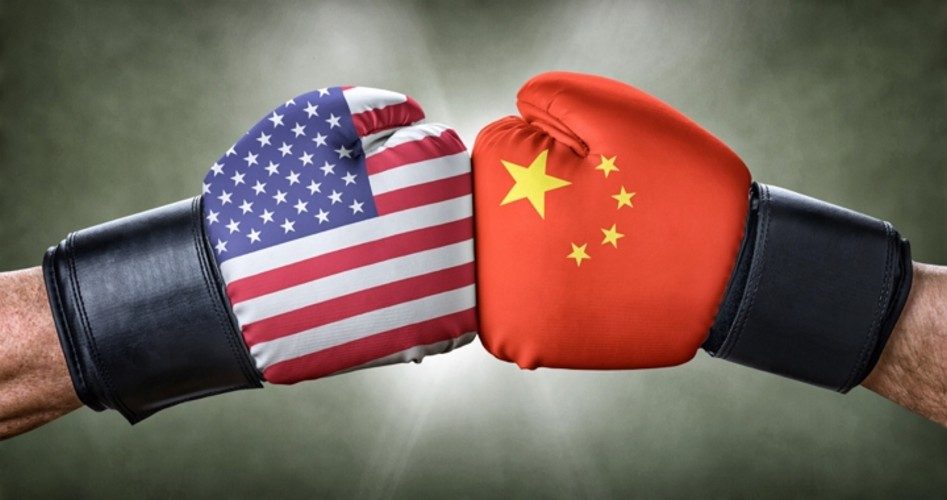
President Trump confirmed Thursday that the United States would begin collecting tariffs on $34 billion worth of goods from China shortly after midnight Friday morning. The Chinese Communist government, saying that the United States had “launched the largest trade war in economic history,” struck back, promising to retaliate with tariffs against American automobiles, agricultural products such as sorghum, cotton, and soybeans, and hundreds of other U.S. goods.
The United States is levying a tariff of 25 percent on more than 800 Chinese product categories, and warned more will come, should China retaliate. Trump has said that U.S. tariffs could eventually be placed on as much as $450 billion in goods, which represents virtually all of China’s exports to America.
American tariffs on Chinese goods include products such as radio transmitters, aircraft parts, computer hard drives, and automobiles. The Trump administration argues that all these Chinese products have benefitted from unfair trade practices.
But China insists that it is the United States that is the villain in the economic confrontation. Gao Feng, the spokesman for the Chinese commerce ministry, claimed, “The U.S. has provoked this trade war. We do not want to fight it, but in order to safeguard the interests of the country and the people, we have no choice but to fight.” The Chinese have called the confrontation between the two giant economies the “biggest trade war in economic history.”
In addition to retaliating against the United States with its own tariff increases, China is expected to report the United States to the World Trade Organization (WTO) as early as Friday, arguing that America is breaching international trade laws. On the other hand, the Trump administration’s justification for slapping its tariffs on Chinese goods is that China is the culprit for using unfair trade tactics to build up a huge trade surplus with the United States. Trump also accuses China of appropriating American technology.
Trump has accused the Chinese of intellectual property theft (using the fruits of American companies’ research and development, without respect for U.S. patent laws), and with throwing up barriers to U.S. businesses which wish to enter the Chinese market. These actions, the president argues, have contributed greatly to the $375 billion U.S. trade deficit with China.
China Daily newspaper, run by the Chinese Communist government, blasted Trump’s actions in an editorial on Friday. “In effect, the Trump dministration is behaving like a gang of hoodlums with its shakedown of other countries, particularly China. Its unruliness looks set to have a profoundly damaging impact on the global economic landscape in the coming decades, unless countries stand together to oppose it.”
It is quite clear that China hopes that by playing the victim card, it can win over world opinion. While some argue that the United States is hurting itself more than China by engaging in a trade war with China, the facts are that China has much more to lose in any protracted trade tit-for-tat with America. Take away China’s exports to the United States, and its economic growth would be severely damaged.
Despite playing the victim in the present conflict, China already limits access to its domestic markets. While threatening to slap tariffs on imported U.S. vehicles on Friday, the truth is that China already has stiff tariffs on American-made passenger cars.
No one credibly disputes Trump’s allegations that the Chinese have brazenly stolen U.S. technology without sufficient compensation to American companies that had developed it. One must ask, since this was the case long before Trump took up residence in the White House, why did previous U.S. presidents, such as George W. Bush and Barack Obama, fail to take action to protect American interests?
Instead, it appears that doctrinaire free-traders want the United States government to sit idly by while American technology is stolen. They argue that cheaper goods from China benefit American consumers, even if the Chinese are practicing unfair trade practices. Certainly, less expensive consumer items are a plus — in the abstract — but are not American industry and its workers deserving of also being defended by their government? While free trade has many benefits, it cannot be allowed to trump American national sovereignty, which can be maintained only if the United States does not allow itself to become dangerously dependent on foreign sources. Besides, the China-U.S. trade in question is not bona fide “free trade” when the Chinese importers are able to sell their goods at artificially low prices because of their theft of technology developed in the United States.
While the mantra is that “we cannot win a trade war,” the facts indicate that actually standing up for the American economy can make a positive difference. For example, German Chancellor Angela Merkel has now agreed to support a reduction of European automobile tariffs on U.S. vehicles, if Washington would likewise forego its threatened car tariffs on European automobiles. Again, the “elephant in the room” is: Until Trump, why has no recent American president taken action to protect American economic interests — in this case with a challenge to the European car tariffs? Why should the Europeans and the Chinese be able to protect their domestic markets, but America should not?
The answer seems obvious. Previous American administrations, both Democrat and Republican, did not put “America First.”
Photo: Zerbor/iStock / Getty Images Plus


